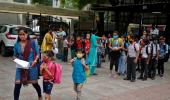As concerns mounted over a potentially more contagious coronavirus variant spreading to many countries, the Centre on Sunday decided to review the resumption of international flights, introduced stricter guidelines for people travelling from or transiting through 'at-risk' countries and issued a slew of directions to the states for ramping up testing-surveillance measures and health facilities.

Alert to the looming threat from the 'Omicron' variant, states began to re-tighten curbs and urgently trace people who arrived from abroad in the last one month while a demand to not allow flights from the affected countries was made by Delhi Chief Minister Arvind Kejriwal and Karnataka Chief Minister Basavaraj Bommai.
No cases of the variant, which was first reported to the World Health Organisation (WHO) from South Africa on November 24, have been recorded in India.
Two South African returnees to Bengaluru, who tested positive for COVID-19, were found to be infected with the delta variant, a Karnataka official said on Sunday.
The Centre has asked all states and UTs to focus on intensive containment, active surveillance, enhanced testing, monitoring of hotspots, increased coverage of vaccination and augmentation of health infrastructure.
The new variant has the potential of developing 'immunoescape mechanisms' which may lead to a decreased efficacy of COVID-19 vaccines, according to All India Institute of Medical Sciences Director Dr Randeep Guelria who said the efficacy of vaccines including those in use in India needs to be evaluated 'critically'.
India, which battled the deadly second wave blamed on the Delta variant in April-May, faces the Omicron challenge after easing curbs to a large extent following an improvement in the situation.
The country saw a single-day rise of 8,309 new coronavirus infections and the active cases declined to 1,03,859, the lowest in 544 days, according to the Union health ministry data updated on Monday.
The daily rise in new coronavirus infections has been below 20,000 for 52 straight days.
After a long hiatus of more than 20 months, the government had on November 26 announced the resumption of scheduled international commercial flights from December 15.
Flights are currently on under bilateral bubble arrangements with countries.
But on Sunday, the government said it will review the decision on the effective date of resumption of scheduled commercial international passenger services as per evolving global scenario.
Passengers travelling from or transiting through 'at-risk' countries will have to undergo RT-PCR test on arrival in India and will be required to wait for the results before leaving the airport or taking a connecting flight, according to revised guidelines issued by the health ministry.
Travellers coming from countries other than those listed as 'at-risk' will be allowed to leave the airport and shall self-monitor their health for 14 days after arrival, but 5 per cent of them will be randomly tested at the airport, it said.
After an urgent meeting chaired by Union Home Secretary Ajay Bhalla and attended by various stakeholders, an official spokesperson said the government will review Standard Operating Procedure on testing and surveillance of incoming international passengers, especially for those countries identified 'at-risk' category.
The meeting was held a day after a high-level review by Prime Minister Narendra Modi in the wake of the concerns over 'Omicron'.
The government has also decided that the genomic surveillance for variants will be further strengthened and intensified and Airport Health Officials (APHOs) and Port Health Officials (PHOs) will be sensitised for strict supervision of testing protocol at airports and seaports.
A closer watch on the emerging pandemic situation within the country will be maintained, the spokesperson said.
The countries at-risk (updated as on November 26, 2021) from where travellers would need to follow additional measures on arrival in India include European countries, the United Kingdom, South Africa, Brazil, Bangladesh, Botswana, China, Mauritius, New Zealand, Zimbabwe, Singapore, Hong Kong and Israel.
Children under five years of age remain exempted from both pre- and post-arrival testing.
However, if found symptomatic for COVID-19 on arrival or during home quarantine period, they shall undergo testing and treated as per laid down protocol
The B.1.1.529 variant, designated as a 'Variant of Concern' by WHO on Friday, has sparked a new wave of restrictions on travellers from various southern African nations by countries such as the United States, Canada, Brazil, Thailand, Indonesia, Singapore, Sri Lanka, the Maldives, Saudi Arabia, Brazil and the European Union.
Listing a series of measures that states and UTs should undertake, Union Health Secretary Rajesh Bhushan in a letter stressed on rigorous surveillance of international passengers, ensuring prompt dispatch of samples for genome sequencing and strict enforcement of COVID-appropriate behaviour to effectively manage this Variant of Concern (VoC).
As a proactive step, the government has already placed nations, where this VoC has been found, in the category of 'at risk' countries for additional follow-up measures of international travellers coming into India from these destinations, he said in a letter dated November 27.
"In view of the possible threat that this VoC can pose to the nation, it is imperative that the intensive containment, active surveillance, increased coverage of vaccination and Covid- appropriate behaviour must be enforced in the field in a very proactive manner to effectively manage this VoC," Bhushan said.
In all such 'hotspots', saturation testing and sending of positive samples quickly for genome sequencing to designated INSACOG labs must be ensured, he said.
INSACOG has been established to monitor the circulating variants in the country, he said, underlining it is important that states must significantly increase sampling from the general population for genome sequencing by sending these samples to the lab network.
Having adequate availability of health facilities across the state is essential to ensure that there are no delays in providing care, he said.
He also asked the states and UTs to hold regular press briefings to disseminate accurate information.
'We have seen in the last surges in the country that discourse on COVID is often influenced by misinformation leading to anxiety in the masses.
'To address this, all states should proactively and regularly address the concerns of community through press briefings and state bulletins providing evidence-based information,' Bhushan said in the letter.
AIIMS Director Dr Randeep Guelria also emphasised the need to be very vigilant and have aggressive surveillance both for international travellers and in the region where there is a sudden increase in the number of cases.
"Also, we must ask everyone to religiously follow COVID-appropriate behaviour and not let their guard down.
"Also, it has to be ensured that people get both doses of vaccine and those who have not yet taken the jab are encouraged to come forward to take it," he said.
In the national capital, Delhi Deputy Chief Minister Manish Sisodia said that all government departments are on high alert and appealed to people to avoid unnecessary gatherings.
The Delhi Disaster Management Authority (DDMA), in its meeting on Monday, is likely to take a call on RT-PCR testing of passengers deboarding from international flights and quarantining of passengers from South Africa, Botswana, Zimbabwe and Hong Kong and other countries where the new coronavirus variant has been reported.
Chief Minister Kejriwal batted for a travel ban on the affected countries.
'Our country has fought a tough fight against corona for the last one and half years... I urge you to stop flights from these regions with immediate effect.
'Any delay in this regard may prove harmful if any affected person enters India,' the letter read.
Confirmed or suspected cases of the new variant have reportedly emerged in several European countries, Israel, Australia and Hong Kong.
"We have also requested the Union government to ban travellers from the three countries (South Africa, Hong Kong and Botswana)," Karnataka Chief Minister Basavaraj Bommai said.
Bommai said he has ordered restrictions at the airport for people coming from countries that are in contact with people from nations where the new Omicron variant has been detected.
"The travellers will be let go only if they test negative for the COVID-19 or else they will be sent to the containment zone.
"Earlier, there was a system that the travellers were allowed to go after collecting samples and then they were quarantined after testing positive," Bommai said.
Citing the high number of COVID cases in Kerala, the chief minister said he has ordered precautionary measures in Dakshina Kannada, Madikeri, Chamarajanagar and Mysuru districts bordering Kerala.
"People coming from Kerala will be let in people only after they test negative for COVID-19. They should have taken two doses of the COVID-19 vaccine. This way we have given direction for round-the-clock monitoring in these districts," the chief minister said.
Madhya Pradesh Chief Minister Shivraj Singh Chouhan said all the people who arrived in the state from international destinations in the past one month will have to go undergo a COVID-19 test.
The state government also withdrew the earlier announced relaxations for schools and decided that they will continue to hold online classes and run physical classes with 50 per cent strength of students only after consent from their parents.
Chouhan had on November 17 announced withdrawal of all coronavirus-related restrictions in Madhya Pradesh with immediate effect while allowing all social, political, sports, entertainment, cultural and religious activities with full capacity.
In Maharashtra, 55 fully vaccinated inmates of an old age home in Thane district and seven others have tested positive for coronavirus and all of them have been admitted to a civil hospital.
The threat from the new variant comes ahead of Christmas-New Year celebrations.
In Goa, the tourism sector which was badly reeling from the pandemic impact is keenly watching the likely impact of the new variant.
Chartered flights and international services bringing in foreign tourists start arriving by the middle of December.
"We are waiting and watching. Till now, at least, there is no impact (of Omicron) but we will have to wait and watch all the developments over the next 15 days. If cases go up, then protocols will have to be adhered to even more strictly," Travel and Tourism Association of Goa president Nilesh Shah told PTI.











 © 2025
© 2025